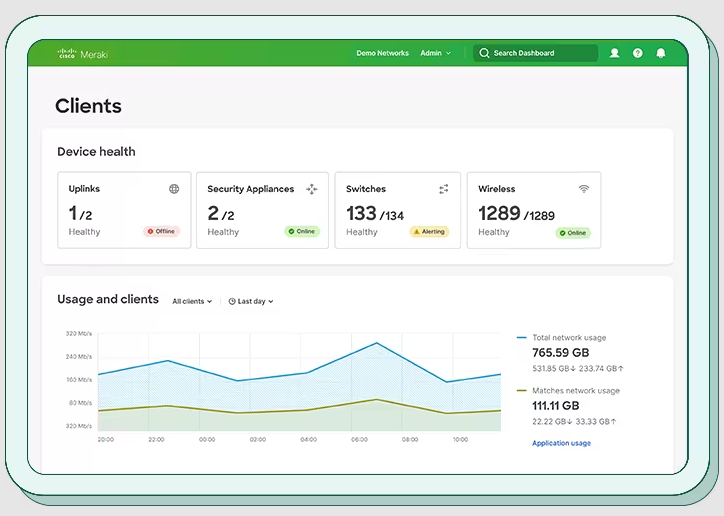With decades in hotel tech, and navigating software’s intricate corridors, I’ve easily merged hospitality with technological advancement. Now, I offer a thorough Cisco Meraki review, shaped by years of using and critiquing network management systems. I will unfold Meraki in the ensuing text, aiming to provide clarity and insight for your network choice deliberations. May your decisions be astute and well-informed.

Cisco Meraki Product Overview
Cisco Meraki, a comprehensive network solution, manages firewall, WiFi, and APs effortlessly, integrating with Windows for admins overseeing network and Meraki devices. Tailored for IT professionals across diverse company sizes, it ensures a stable internet connection, employs a Meraki firewall, and offers robust router and endpoint management.
Addressing the complexity of managing SD-WAN and enhancing bandwidth control, it offers advanced features like Auto VPN, securing the network further with meticulous content filtering.
Despite potential concerns around licensing cost, Cisco Meraki reviews highlight its rich user interface and adept handling of security features, maintaining a cohesive network environment and safeguarding wireless access point connections for both Mac and Windows environments using Cisco products.
Pros
- Scalability: Cisco Meraki allows businesses to grow their networks without substantial manual reconfiguration.
- Remote Troubleshooting: The tool offers remote diagnostics that enable IT teams to identify and resolve issues without being on-site.
- Robust Analytics: It provides thorough, insightful data on network usage and performance, aiding strategic planning and issue identification.
Cons
- Cost Concerns: Cisco Meraki often falls on the pricier side of the spectrum, requiring a substantial budget, especially for larger networks.
- Complexity for Small Users: Small businesses or users with simpler network needs might find the array of features overwhelming and underutilized.
- Hardware Dependency: Once embedded in the Meraki ecosystem, shifting to a different vendor’s hardware can become a considerable challenge due to integration and compatibility hurdles.
Expert Opinion
In the vast panorama of network management tools, Cisco Meraki does carve a niche that is undeniably potent for certain user demographics.
Weighing its feature set, which encompasses a gamut from real-time alerts to extensive analytics, against its pricing and usability, it seems Meraki often steers its strongest appeal towards medium to larger enterprises where network complexity and scale can justify the investment.
The interface, in my judgment, strikes a balance between comprehensive data presentation and user-friendly design, although the sheer depth of options can be a tad overwhelming for novices.
In terms of support and onboarding, Cisco does manage to uphold a reputation for being reasonably supportive, albeit with nuances that seasoned IT professionals might navigate more deftly.
Upon juxtaposition with competitors, it outperforms in scalability and analytics, but underperforms in cost-effectiveness and can be seen as over-complex for smaller, less intricate networks. Therefore, while determining its fit, potential users should weigh the rich functionality against the associated financial and complexity costs.
Cisco Meraki: The Bottom Line
Diving into the unique offerings of Cisco Meraki, one immediately finds a meticulously crafted combination of scalability, robust analytics, and remote troubleshooting capabilities that are rarely paralleled in the industry.
The standout element undoubtedly resides in its capability to present complex, in-depth network data in a manner that is both insightful for decision-makers and actionable for IT professionals.
It threads a path that meanders between intricate, data-driven network management and user-accessible interfaces, thus aligning itself with environments that necessitate a robust, scalable, and insight-rich network management solution.
The sheer breadth and depth of its analytics, coupled with a centralized management dashboard, undeniably place it in a position of note for those navigating the selection of a network management platform.
Cisco Meraki Deep Dive
Product Specifications
- Centralized Management - Yes
- Real-time Monitoring - Yes
- Network Traffic Analytics - Yes
- Device Health Status - Yes
- Configuration Management - Yes
- Bandwidth Management - Yes
- Remote Troubleshooting Tools - Yes
- Role-Based Access Control - Yes
- Scalability & Modular Expansion - Yes
- Security & Threat Management - Yes
- Compliance Reporting - Yes
- Backup & Restore Functions - Yes
- Integration Capabilities - Yes
- Alerting & Notification System - Yes
- Wireless Infrastructure Management - Yes
- VPN Configuration & Management - Yes
- User & Device Profiling - Yes
- Cloud Management - Yes
- Event Logging & Audit Trails - Yes
- DHCP & IP Management - Yes
- Quality of Service (QoS) Management - Yes
- Firmware Updates & Patch Management - Yes
- Mobile Device Management - Yes
- Mesh Networking Capabilities - Yes
- API Accessibility - Yes
Cisco Meraki Feature Overview
- Centralized Management: Meraki offers an intuitive dashboard that consolidates various network components, enhancing visibility and control.
- Real-time Monitoring: Users can oversee network performance and health in real time, enabling swift intervention and management.
- Network Traffic Analytics: Deep insights into network traffic assist in understanding usage patterns and potential bottlenecks.
- Remote Troubleshooting Tools: Address network issues without being on-site, a critical feature for expansive or geographically diverse networks.
- Security & Threat Management: Meraki’s rigorous security measures safeguard networks from potential threats and unauthorized access.
- Scalability & Modular Expansion: As your network grows, Meraki evolves with you, adapting effortlessly to expanding requirements.
- Wireless Infrastructure Management: Managing wireless networks, from access points to user devices, becomes simplified with Meraki.
- Alerting & Notification System: Stay informed with real-time alerts on critical events or potential issues within the network.
- Quality of Service (QoS) Management: Prioritize network traffic based on business needs, ensuring vital applications receive bandwidth precedence.
- Mobile Device Management: Oversee and manage mobile devices accessing the network, ensuring security and compliance.
Standout Functionality
- Intuitive Dashboard: While many platforms provide centralized management, Meraki’s dashboard stands out due to its user-friendliness and depth of insights.
- Robust Security Measures: Meraki’s multi-faceted security approach, encompassing threat detection and secure access, is particularly rigorous.
- Integrated Mobile Device Management: Not all network management solutions offer an integrated MDM. Meraki’s inclusive approach ensures even mobile devices adhere to network standards.
Integrations
Cisco Meraki integrates natively with various Cisco solutions, ensuring easy interplay. Tools like Cisco Umbrella and Cisco Advanced Malware Protection (AMP) work in tandem with Meraki. An accessible API allows for custom integrations, catering to unique business needs. The Meraki Marketplace also offers a slew of add-ons to enhance platform capabilities, tailored to specific industries or requirements.
Cisco Meraki Pricing
Pricing upon request.
Ease of Use
Navigating Cisco Meraki, I find the interface to be thoughtfully designed, with a clear focus on user experience. The centralized dashboard brings together a plethora of tools and analytics, making network management relatively streamlined. However, for someone new to network management or without a technical background, the sheer depth of features can initially be overwhelming. The onboarding process is methodical, but there's a learning curve to truly harness the platform's full potential.
Customer Support
Engaging with Cisco Meraki's support, I noticed a commendable emphasis on user education and problem resolution. They offer various channels, from documentation to webinars, catering to different learning preferences. Live chat is prompt, and the support team exhibits a deep understanding of the product. However, sometimes finding specific resources in their extensive documentation can feel like looking for a needle in a haystack. A more streamlined or search-optimized support resource library could enhance the user experience.
Cisco Meraki Use Case
Who Would Be A Good Fit For Cisco Meraki?
In my assessment, Cisco Meraki thrives in environments where network management is crucial yet must remain non-disruptive to ongoing operations. The sectors, where it demonstrates high utility, span education, retail, and enterprises that require meticulous network oversight. Larger enterprises, especially those with numerous remote sites or a need for precise control over network traffic and user access, find Meraki to be a steadfast ally.
IT teams, particularly those that manage expansive, multifaceted networks, tend to leverage Meraki to alleviate the complexity of managing disparate components, resulting in a cohesive, centrally managed network.
Who Would Be A Bad Fit For Cisco Meraki?
Conversely, small businesses or startups, especially those with basic network needs and limited budgets, might find Cisco Meraki to be more than they require. While its robustness is undeniably beneficial for complex networks, smaller entities often find themselves paying for functionalities they do not leverage.
Industries or environments that lack a dedicated IT team or substantive IT knowledge might find the learning curve and depth of features daunting. Moreover, companies that prefer on-premise solutions might find Meraki’s cloud-centric management approach misaligned with their IT strategy.
Cisco Meraki FAQs
What distinguishes Cisco Meraki’s dashboard?
Cisco Meraki’s dashboard provides a centralized, comprehensive view of the network, offering in-depth analytics, real-time monitoring, and a suite of management tools, all within a user-friendly interface.
Is there an API for custom integrations?
Yes, Cisco Meraki offers an API that facilitates custom integrations and allows businesses to tailor the platform to their unique needs.
How does Cisco Meraki ensure network security?
Cisco Meraki provides multi-layered security, including threat protection, secure access, and a plethora of features dedicated to safeguarding the network from various vulnerabilities.
Can Cisco Meraki manage mobile devices?
Yes, Cisco Meraki includes Mobile Device Management (MDM) functionalities, allowing for the management and policy application to mobile devices within the network.
Does Cisco Meraki allow role-based access control?
Yes, administrators can define and assign roles, ensuring individuals have access only to relevant sections of the Meraki dashboard.
How does Cisco Meraki support scalability?
Meraki enables modular scalability, allowing businesses to expand and adjust their networks effortlessly as their needs evolve.
Is Cisco Meraki suitable for multi-site management?
Yes, its centralized management and remote troubleshooting tools make it apt for managing networks spread across multiple locations.
Can Cisco Meraki manage wireless infrastructures?
Yes, it provides tools and functionalities to manage wireless networks, including access points and user device management.
Alternatives to Cisco Meraki
- Aruba Networks: Known for providing a solid alternative in locations where rugged and outdoor networking equipment is required due to its durable hardware.
- Ubiquiti Networks: A go-to for smaller businesses or entities with a tight budget, given its competitive pricing and user-friendly interface.
- Juniper Networks: Favoured in environments that demand a highly secure and meticulously compliant network, due to its focus on creating inherently secure networks.
Cisco Meraki Company Overview & History
Cisco Meraki, a subsidiary under the expansive umbrella of Cisco Systems, operates with a mission to simplify the ever-complex realm of network management. Renowned companies, including Accor Hotels and United States University, trust it to provide a stable, secure, and scalable networking foundation. Located in San Francisco, this company blossomed from a research project at MIT, growing into a pivotal entity within Cisco, dedicated to cloud-based IT solutions.
Known for its signature product, the Meraki dashboard, it emphasizes creating technology that saves time, fostering the maximization of IT impact. It operates with a vision to leverage technology as a powerful means to enable broader connectivity and greater accessibility to information.
Summary
In navigating through the multifaceted domain of network management with Cisco Meraki, it becomes evident that its strengths lie in robustness, a comprehensive feature set, and a dedicated approach to securing and simplifying complex networks. While it affirms itself as a stalwart ally for expansive enterprises and those with intricate networking needs, smaller entities might find it an imposing and potentially suboptimal investment.
Nevertheless, the precision, control, and depth it offers carve out its place as a notable contender in the realm of network management. I invite fellow professionals to share their encounters and insights into maneuvering the digital threads of their enterprises with Cisco Meraki, weaving together a tapestry of collective experiences to guide future navigations through the digital landscape.

